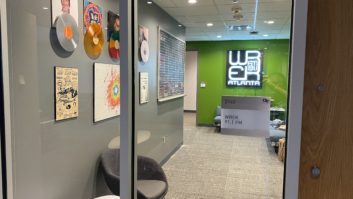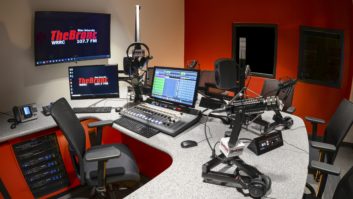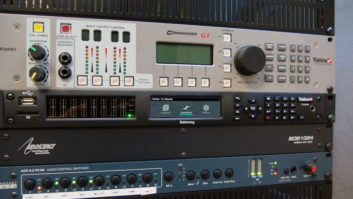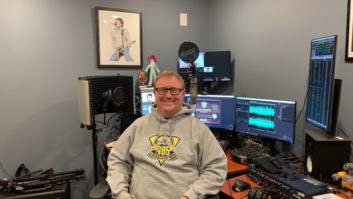(click thumbnail)The Intercollegiate Broadcasting System has launched an Internet radio network aimed at student broadcasters, working with supplier Backbone Networks Corp. A proof-of-concept pilot project is underway.
Operated by the IBS using the high-speed networks and servers of Backbone, the IBS SRN is a resource of shared programming for student broadcasters.
To access it and stream their own content over the Web, “all a student-run station needs is an ordinary Apple Mac computer and a broadband connection,” says Richard Cerny, Backbone’s president. “We handle everything else, letting their listeners tune in using iTunes or QuickTime.”
According to IBS Chief Operating Officer Fritz Kass, the advantages are substantial for high school/collegiate radio station users.
“IBS members can draw on the programming of other IBS members over the network,” he said. “This is especially valuable for national interest college sporting events (or) a national interest speaker, concert or news story available at one IBS member station but of interest to all 1,000 school and college radio station IBS serves.” Similarly, each station will be able to syndicate its own programming to sister stations on the network.
For IBS stations to become charter members and take part in the current 25-station pilot launch, “the cost per station is only $750, which includes a $75 set-up fee and three months of Backbone hosting their Internet station at $225/month,” Cerny said. Content is from members and from third-party sources of royalty-free music, news and commentary that will syndicate content to the network. Some content, such as IDs adding a professional network sound and feel, will be provided by IBS.
IBS has a contract with Backbone, which is paid out of that income. “This fee is primarily intended to help offset Backbone’s infrastructure and development costs, and we anticipate future costs to be reduced by ads and/or underwriting,” Cerny said.
Streams
A wealth of student-generated content available through the IBS SRN will allow members to “expand their online stations to 24/365 without being in the studio all the time,” says Kass.
Being able to deliver 24 hours of programming with three hours of studio time “is a critical education advantage for a high school student radio that has a limited school day and no campus or dormitories,” said Kass.
To aid student stations in creating their own online stations, the network provides each member with archive storage for up to 250 hours of songs, images and clips. One important feature: Music on these programs is covered by the IBS member’s existing copyright music licenses facilitated by IBS agreement with the copyright holders, so there’s no fear of extra copyright fees levied against SRN member stations.
Second, joining the IBS SRN gives a student station access to program automation capability, using Backbone Radio Pro client software. “In addition, this gives student stations the ability to cover remote events, like concerts and ‘away’ games from other school,” Cerny said. “The software also provides automated reporting and record keeping.”
The IBS SRN gives each station enough bandwidth to support up to 200 streams at a time, with a monthly ceiling of 15,900 monthly listener hours. Backbone’s network infrastructure can be accessed by participating outside program producers to supply material to IBS.
Finally, using the IBS SRN, “IBS members can build their national audience and brands, and the IBS brand, with sound logos and famous person station IDs,” Cerny said.
The network uses MPEG-4 AAC as its streaming format. “Conforming to this standard not only ensures universal acceptance across all listening platforms, but it also enables each school to partner with the Apple iTunes store in preparing material, including artist/album annotation and cover art images that display to listeners’ free QuickTime or iTunes players,” the organizations stated in their announcement.
Challenges
Backbone started out as a developer of broadcasting software, with the aim of developing a robust architecture for Internet radio streaming. “The cornerstones of the company’s technology lie in its client/server implementation of MPEG-4 automation, streaming and reporting,” Cerny said “Backbone now offers this software with a no-cost license under a service model using company-hosted facilities.”
For IBS, the establishment of the IBS SRN exponentially increases its ability to serve the non-profit organization’s 1,000 member stations. Backbone has “solved all the technology issues,” says Kass. Now IBS needs to get the information out to its 1,000 school and college radio stations.
This should not be a major challenge. However, convincing a sufficient number of members to sign up for the IBS SRN could be. The problem is not quality but cost: IBS member stations are publicly owned and thinly funded. They can manage to afford the annual $95 IBS membership fee, but paying another $2,700 a year to join the IBS SRN may be more than most can financially stomach.
Mindful of this, the pilot phase of the IBS SRN only needs 25 stations to be operational. “We have 10–12 members so far, and expect to hit the 25-station mark without major problems,” says Richard Cerny.
He declined to list participating stations. “Stations are immediately operational,” he said in May, “and we anticipate rudimentary content sharing by July 1, live feed sharing by Aug. 1, fully operational by Sept. 1.”
As for adding further members? “As time goes on, IBS members on the IBS SRN will have funding options, such as participating in grants or advertising and underwriting opportunities to either defray or eliminate the network costs,” Kass said.
Organizers are hoping that $225 a month for access to substantial programming resources, remote broadcasting links and complete Web hosting/streaming will sound like an astoundingly good deal.
For information about IBS, visit www.ibsradio.org.








